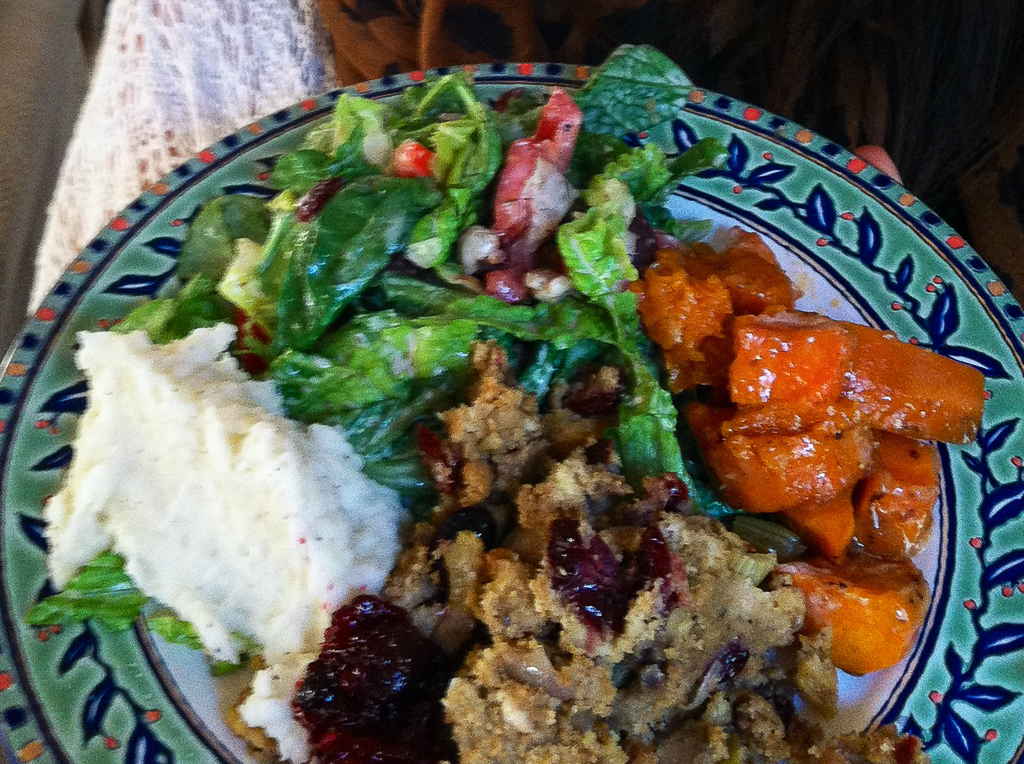Thanksgiving is one holiday which holds some of my fondest memories. It was the time of year my family took a vacation, and so it’s synonymous in my mind with building forts in the woods of utah, visiting my grandpa in Colorado and sailing to Catalina Island.
These memories are only predated by my kindergarten activities. Our class made Pilgrim and Indian outfits out of Albertson’s paper shopping bags and ate together outside, giggling and sharing peanut butter and jelly and being together — “Just like the first Thanksgiving,” our teacher told us.
I imagine most of us who were in the United States for our primary school education participated in similar traditions right around this time of year. Yet, as I’ve grown and read, studied and asked, I’ve come to question simplistic presentations of this country’s history. Not that I’m calling into question the PB&Js.
The myth of the first Thanksgiving goes something as follows: pilgrims settled a wild eastern coast when, in 1620, their ship landed on Plymouth Rock. They had a very difficult first winter. Many died. But the friendly neighborhood Indians — led by the English-speaking Squanto — taught them how to farm, and so the next harvest, they all had a big feast together to thank God for providing. And they lived happily ever after.
First of all, when this story is told as the foundation of this nation, it leaves out a significant segment of Hispanic occupation from the history of this soil. Cast this way, the Spanish are seen as invaders — but the English, settlers. This mindset, instilled early by textbooks, has trickled down to affect Mexican and South American immigrants.
But this isn’t even the prime disgrace caused by chiseling away this country’s history. What this brief account of the “first Thanksgiving” leaves out is the entire experience of the American Indian people.
James W. Lowen surveyed 18 textbooks, contributed to by 46 authors, used to teach the history of America in elementary school. In his work, Lies My Teacher Told Me, he addresses the harm done by an ethnocentric view of history, and recounts the untold stories.
The arrival of the Europeans that preceded those on the Mayflower — such as fisherman who would sort their catch on shore, and take the occasional American Indian captive for the slave trade — took a devastating toll on this nation’s first residents. These seafarers brought with them diseases unknown to the American Indians. Unable to fight the disease, North America’s first eastern-shore societies laid to waste.
“Within three years, the plague wiped out between 90 to 96 percent of the inhabitants of coastal New England. Native societies lay devastated,” Loewen writes.
The dead stacked so high that survivors abandoned villages. These villages, complete with cleared fields, were some of the villages first inhabited by the new European immigrants. The Pilgrims excavated corn seed from American Indian burial grounds, and sowed it on the abandoned, but cleared fields.
The sense of manifest destiny and divine right over this new country they inhabited colored the way in which the Pilgrims viewed the epidemic plague. Ronald Takaki’s multicultural history work entitled A Different Mirror summarizes English thought of the time: “When the Lord decided to transplant his people, he made the country vacant for them to settle,” the people believed.
This mindset assumes that the American soil was given to the Pilgrims by God, and downplays the reality of the situation: the Pilgrims were not settlers of a wild frontier, but colonizers profiting on the misfortune and death of another people.
And where does Squanto fit in? Indeed, he was crucial to the Pilgrims’ survival. But his story — one that rivals some of our best adventure epics — is nearly never told. Kidnapped and trafficked back to Europe as a young boy, Squanto was sold into slavery in Spain. There he stayed long enough to learn the language, before eventually stealing his way out of the country and pilgrimaging back to his home. There, he found he was the sole remaining member of his community — all the rest died of the plague. What choice did he then have but to align himself with the eastern coast’s new occupants?
Now that I’m grown, Thanksgiving looks a lot different. We don’t go anywhere anymore. My dad doesn’t make it to dinner. But we don’t throw out the tradition altogether. In fact, staying in one place means sharing Thanksgiving dinner with my grandma. Each year, she reminds us to not only be thankful for our food, but every hand that touches it along the way. We take time to pause and consider the single mothers working an extra shift at the grocery back toward the migrant workers in the field.
If ever there was a good reason for a public holiday, giving thanks for the resources, opportunities, liberties and other privileges afforded to us in this country is as good a reason as any. But let’s not do this in a way that minimizes, marginalizes, or masks the costs others have paid for those privileges. Being honest about the origin of our privilege is a sometimes painful process. But, as students of a Christian university, we should prize truth over tradition.
This Thanksgiving pause not only to remember what your blessings are, but how they got there.







